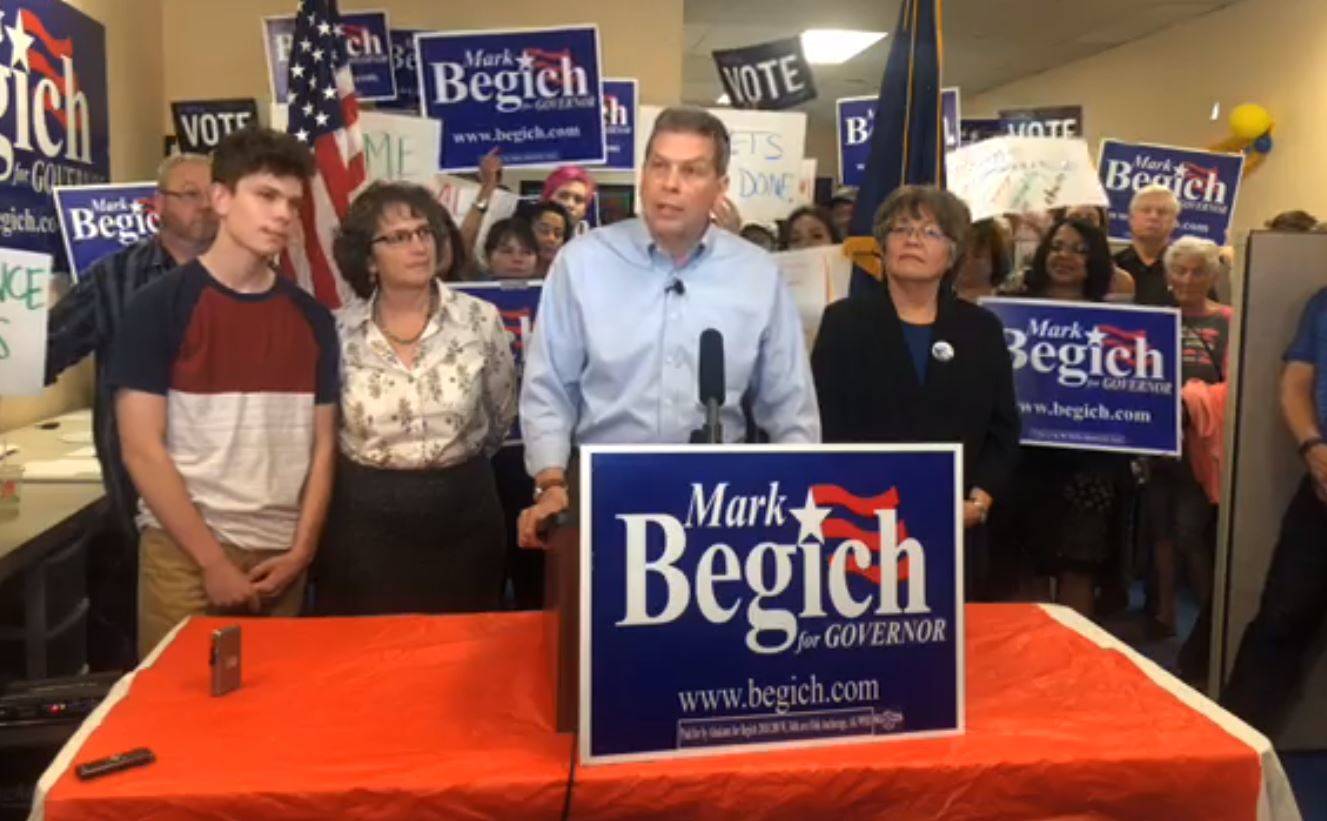Correction: An earlier version of this article incorrectly stated that independent Shawn Butler, winner of the House District 29 Democratic primary, had withdrawn from the general election. He did not withdraw. Butler remains on the ballot and will face Republican Ben Carpenter. That paragraph is now deleted. The Empire regrets the error.
Mark Begich is staying in the 2018 general election.
In a brief ceremony Tuesday afternoon, Begich confirmed that Alaskans will choose from three main options for governor in November.
“I’m in the race to win. It’s a three-way race, so get used to it,” he said to the cheers of supporters in his Anchorage campaign office.
The former U.S. Senator, who has been out of politics since his 2014 loss to Republican challenger Dan Sullivan, won the Democratic nomination for governor unopposed. Despite Tuesday’s announcement, he faces major challenges before the Nov. 6 statewide general election.
Democrats are divided about his candidacy, with many preferring the “unity ticket” headlined by incumbent independent Gov. Bill Walker. An August poll commissioned by the AFL-CIO found only 51 percent of Democrats prefer Begich in a three-way race.
Walker and Begich are expected to split the votes of Alaska’s moderate and progressive voters, leaving the state’s large conservative voting block to Republican Mike Dunleavy, who now becomes the presumptive favorite. Polls throughout the summer have found Dunleavy leading a three-way contest.
Libertarian gubernatorial candidate Billy Toien will also appear on the general election ballot but has not been included in most polls.
In a statement provided to the Empire after Begich’s announcement, the Walker campaign said “a three-way race is a race to 40 percent.”
“Regardless of how many candidates are in the race, this election will come down to the decisions made on the Permanent Fund and the fiscal plan,” the Walker statement said.
In a prepared statement, the Dunleavy campaign said the three-way race resulted “after months of closed door meetings with power brokers and special interests” that “failed to pull off another scheme to disenfranchise Alaskan voters” by having either Walker or Begich withdraw from the race.
The “another” refers to the 2014 creation of the unity ticket between Walker and Byron Mallott, who switched from the Democratic gubernatorial candidate to Walker’s lieutenant governor.
In his Anchorage speech, Begich pledged to be “steadfast standing against the Trump Administration” and urged Alaskans to vote for what they want rather than trying to be strategic.
“We need your help, we need your volunteer time, we need your money,” he said. “We’ve got 63 days. We need to make it happen; you will make it happen.
All three major-party gubernatorial candidates will appear in Juneau this week for fundraisers and the Juneau Chamber of Commerce gubernatorial forum.
While Begich did not quit before Tuesday’s 5 p.m. deadline for withdrawal from the election, a handful of state House candidates have dropped out.
According to the Alaska Division of Elections, Ketchikan independent incumbent Dan Ortiz now faces just one challenger in the general election. Democrat Ghert Abbott withdrew after winning the Democratic primary for House District 36.
Ortiz was a member of the Democratic-led coalition House Majority during the most recent Legislature. He now faces Republican Trevor Shaw in the general election.
In House District 31, Andy Cizek and Greg Madden of Soldotna have withdrawn from the general election, leaving Republican Sarah Vance to challenge independent candidate Paul Seaton.
Seaton, the incumbent, is a longtime Republican, but he switched to a nonpartisan campaign after the Alaska Republican Party withdrew all support for him in retaliation for his move to join the coalition House Majority.

